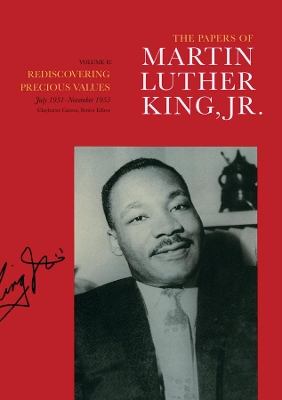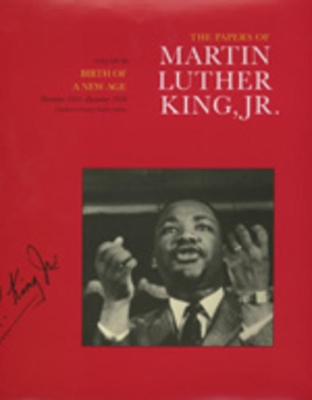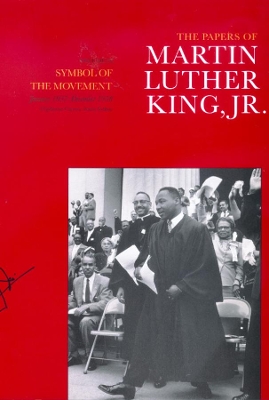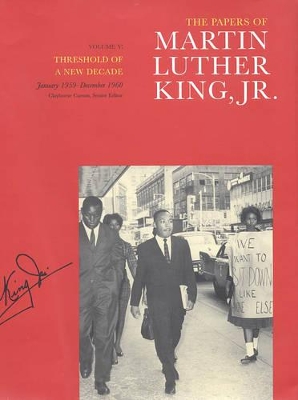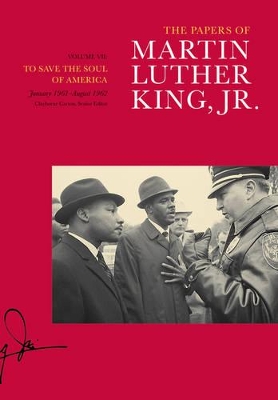Martin Luther King Papers
6 primary works
Book 2
The Papers of Martin Luther King, Jr., Volume II
by Martin Luther King, Jr.
Published 7 December 1994
Martin Luther King, Jr.'s ideas - his call for racial equality, his faith in the ultimate triumph of justice, his insistence on the power of nonviolence to bring about a major transformation of American society - are as vital and timely as ever. The wealth of his writings, both published and unpublished, are now preserved in this authoritative, chronologically arranged, multi-volume edition. Volume Two begins with King's doctoral work at Boston University and ends with his first year as pastor of the historic Dexter Avenue Baptist Church in Montgomery, Alabama. It includes papers from his graduate courses and a fully annotated text of his dissertation. There is correspondence with people King knew in his years prior to graduate school and a transcription of the first known recording of a King sermon. We learn, too, that Boston was where King met his future wife, Coretta Scott. Accepting the call to serve Dexter, the young King followed the church's tradition of socially active pastors by becoming involved in voter registration and other social justice issues. In Montgomery he completed his doctoral work, and he and Coretta Scott began their marriage.
"The Papers of Martin Luther King, Jr." represents a testament to a man whose life and teaching have had a profound influence, not only on Americans, but on people of all nations. The Martin Luther King, Jr., Papers Project at Stanford University was established by the Center for Nonviolent Social Change, Inc. in 1984.
"The Papers of Martin Luther King, Jr." represents a testament to a man whose life and teaching have had a profound influence, not only on Americans, but on people of all nations. The Martin Luther King, Jr., Papers Project at Stanford University was established by the Center for Nonviolent Social Change, Inc. in 1984.
Book 3
The Papers of Martin Luther King, Jr., Volume III
by Martin Luther King, Jr.
Published 27 February 1997
Martin Luther King, Jr.'s ideas - his call for racial equality, his faith in the ultimate triumph of justice, his insistence on the power of nonviolence to bring about a major transformation of American society - are as vital and timely as ever. The wealth of his writings, both published and unpublished, is now preserved in this authoritative, chronologically arranged multi-volume edition. Volume III chronicles the Montgomery bus boycott of 1956 and Dr. King's emergence as a public figure who attracted international attention. Included is the galvanizing speech he gave on the first day of the bus boycott, transcribed from a fragile tape recording and published here in its entirety for the first time. Also included are his remarks to an angry crowd after the bombing of his home and his powerful speech at the 1956 NAACP convention. King's words from this period reveal the evolution of his distinctive blend of Christian and Gandhian ideas and show his appreciation of the broader significance of the Montgomery movement, a protest that revealed the 'longing for human dignity that motivates oppressed people all over the world'. "The Papers of Martin Luther King, Jr." is a testament to a man whose life and teaching continue to have a profound influence not only on Americans, but on people of all nations.
The Martin Luther King, Jr., Papers Project at Stanford University was established by The Center for Nonviolent Social Change, Inc., in 1984.
The Martin Luther King, Jr., Papers Project at Stanford University was established by The Center for Nonviolent Social Change, Inc., in 1984.
Book 4
Acclaimed by "Ebony" magazine as 'one of those rare publishing events that generate as much excitement in the cloistered confines of the academy as they do in the general public', "The Papers of Martin Luther King, Jr." chronicles one of the twentieth century's most dynamic personalities and one of the nation's greatest social struggles. King's call for racial justice and his faith in the power of nonviolence to engender a major transformation of American society is movingly conveyed in this authoritative multivolume series. In "Volume IV", with the Montgomery bus boycott at an end, King confronts the sudden demands of celebrity while trying to identify the next steps in the burgeoning struggle for equality. Anxious to duplicate the success of the boycott, he spends much of 1957 and 1958 establishing the Southern Christian Leadership Conference. But advancing the movement in the face of dogged resistance, he finds that it is easier to inspire supporters with his potent oratory than to organize a mass movement for social change.
Yet King remains committed: 'The vast possibilities of a nonviolent, non-cooperative approach to the solution of the race problem are still challenging indeed. I would like to remain a part of the unfolding development of this approach for a few more years'. King's budding international prestige is affirmed in March 1957, when he attends the independence ceremonies in Ghana, West Africa. Two months later his first national address, at the 'Prayer Pilgrimage for Freedom', is widely praised, and in June 1958, King's increasing prominence is recognized with a long-overdue White House meeting. During this period King also cultivates alliances with the labor and pacifist movements, and international anticolonial organizations. As "Volume IV" closes, King is enjoying the acclaim that has greeted his first book, Stride Toward Freedom, only to suffer a near-fatal stabbing in New York City.
Yet King remains committed: 'The vast possibilities of a nonviolent, non-cooperative approach to the solution of the race problem are still challenging indeed. I would like to remain a part of the unfolding development of this approach for a few more years'. King's budding international prestige is affirmed in March 1957, when he attends the independence ceremonies in Ghana, West Africa. Two months later his first national address, at the 'Prayer Pilgrimage for Freedom', is widely praised, and in June 1958, King's increasing prominence is recognized with a long-overdue White House meeting. During this period King also cultivates alliances with the labor and pacifist movements, and international anticolonial organizations. As "Volume IV" closes, King is enjoying the acclaim that has greeted his first book, Stride Toward Freedom, only to suffer a near-fatal stabbing in New York City.
Book 5
Book 5
The Papers of Martin Luther King, Jr., Volume V
by Martin Luther King, Jr.
Published 14 February 2005
"The Papers of Martin Luther King, Jr." has become the definitive record of the most significant correspondence, sermons, speeches, published writings, and unpublished manuscripts of one of America's best-known advocates for peace and justice. "Threshold of a New Decade, Volume V" of the planned fourteen-volume series, illustrates the growing sophistication and effectiveness of King and the organizations he led while providing an unparalleled look into the surprising emergence of the sit-in protests that sparked the social struggles of the 1960s. During this pivotal period of his career, King traveled to India in early 1959 to meet with Prime Minister Nehru and other associates of Mahatma Gandhi. After returning to Montgomery, King confronted the continuing ineffectiveness of his Southern Christian Leadership Conference (SCLC) by demanding personnel changes and agreeing to relocate to Atlanta at the beginning of 1960.
King's move took place just before African American students in the South reclaimed the energy of the Montgomery bus boycott with their bold sit-in protests, which King predicted would become 'an integral part of the history which is reshaping the world, replacing a dying order with modern democracy'. He was arrested in October after participating in a sit-in protest in Atlanta. His resulting imprisonment led presidential candidate John F. Kennedy to phone his sympathies to King's wife, Coretta, a move many credit for providing the margin of victory in the close election of 1960.
King's move took place just before African American students in the South reclaimed the energy of the Montgomery bus boycott with their bold sit-in protests, which King predicted would become 'an integral part of the history which is reshaping the world, replacing a dying order with modern democracy'. He was arrested in October after participating in a sit-in protest in Atlanta. His resulting imprisonment led presidential candidate John F. Kennedy to phone his sympathies to King's wife, Coretta, a move many credit for providing the margin of victory in the close election of 1960.
Book 7
The Papers of Martin Luther King, Jr., Volume VII
by Martin Luther King, Jr.
Published 1 October 2014
Preserving the legacy of one of the twentieth century's most influential advocates for peace and justice, The Papers of Martin Luther King, Jr., is described by one historian as being the "equivalent to a conversation" with King. To Save the Soul of America, the seventh volume of the anticipated fourteen-volume edition, provides an unprecedented glimpse into King's early relationship with President John F. Kennedy and his efforts to remain relevant in a protest movement growing increasingly massive and militant. Following Kennedy's inauguration in January 1961, King's high expectations for the new administration gave way to disappointment as the president hesitated to commit to comprehensive civil rights legislation. As the initial Freedom Ride catapulted King into the national spotlight in May, tensions with student activists affiliated with the Student Nonviolent Coordinating Committee (SNCC) were exacerbated after King refused to participate in subsequent freedom rides. These tensions became more evident after King accepted an invitation in December 1961 to help the SNCC-supported Albany Movement in southwest Georgia.
King's arrests in Albany prompted widespread national press coverage for the protests there, but he left with minimal tangible gains. During 1962 King worked diligently to improve the effectiveness of the Southern Christian Leadership Conference (SCLC) by hiring new staff and initiating grassroots outreach. King also increased his influence by undertaking an overcrowded schedule of appearances, teaching a course at Morehouse College, and participating in an additional round of protests in Albany during July 1962. As King confronted these difficult challenges, he learned valuable lessons that would later impact his efforts to desegregate Birmingham, Alabama, in 1963.
King's arrests in Albany prompted widespread national press coverage for the protests there, but he left with minimal tangible gains. During 1962 King worked diligently to improve the effectiveness of the Southern Christian Leadership Conference (SCLC) by hiring new staff and initiating grassroots outreach. King also increased his influence by undertaking an overcrowded schedule of appearances, teaching a course at Morehouse College, and participating in an additional round of protests in Albany during July 1962. As King confronted these difficult challenges, he learned valuable lessons that would later impact his efforts to desegregate Birmingham, Alabama, in 1963.
